| Listing 1 - 10 of 13 | << page >> |
Sort by
|
Periodical
ISSN: 16784502 Year: 2001 Publisher: Ribeirão Preto, Brasil : Sociedade Brasileira de Genética,
Abstract | Keywords | Export | Availability | Bookmark
 Loading...
Loading...Choose an application
- Reference Manager
- EndNote
- RefWorks (Direct export to RefWorks)
Genetics --- Genetics. --- Genetic Structures --- Genetic Phenomena --- Biology --- Embryology --- Mendel's law --- Adaptation (Biology) --- Breeding --- Chromosomes --- Heredity --- Mutation (Biology) --- Variation (Biology)
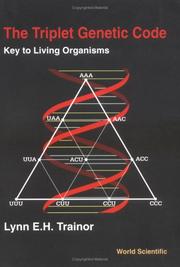
ISBN: 1281951919 9786611951917 9812810420 9789812810427 9781281951915 9810244673 9789810244675 9810244681 9789810244682 Year: 2001 Publisher: Singapore New Jersey World Scientific
Abstract | Keywords | Export | Availability | Bookmark
 Loading...
Loading...Choose an application
- Reference Manager
- EndNote
- RefWorks (Direct export to RefWorks)
The purpose of this book is to bring to interested readers (professionals and laypersons alike) an appreciation and a basic understanding of what the genetic code is and why it has come to revolutionize thinking about living systems as a whole. The consequences of this revolution in molecular biology are so vast as to be almost incomprehensible. It seems important in a democratic society to have a citizenry well informed about the crucial issues of the day, such as genetic engineering and molecular medicine, which impact the social order and the ethos of society in such a profound way. This bo
Genetics. --- Genetic code. --- Nucleotide sequence --- Biology --- Embryology --- Mendel's law --- Adaptation (Biology) --- Breeding --- Chromosomes --- Heredity --- Mutation (Biology) --- Variation (Biology)

ISBN: 0521598362 052159166X 0511609086 9780521591669 9780521598361 9780511609084 Year: 2001 Publisher: Cambridge Cambridge University Press
Abstract | Keywords | Export | Availability | Bookmark
 Loading...
Loading...Choose an application
- Reference Manager
- EndNote
- RefWorks (Direct export to RefWorks)
The debate over the relative importance of natural selection as compared to other forces affecting the evolution of organisms is a long-standing and central controversy in evolutionary biology. The theory of adaptationism argues that natural selection contains sufficient explanatory power in itself to account for all evolution. However, there are differing views about the efficiency of the adaptation model of explanation. If the adaptationism theory is applied, are energy and resources being used to their optimum? This book presents an up-to-date view of this controversy and reflects the dramatic changes in our understanding of evolution that have occurred in the last twenty years. The volume combines contributions from biologists and philosophers, and offers a systematic treatment of foundational, conceptual, and methodological issues surrounding the theory of adaptationism. The essays examine recent developments in topics such as phylogenetic analysis, the theory of optimality and ess models, and methods of testing models.
Evolution. Phylogeny --- Adaptation (Biology) --- Adaptation (Biology). --- Evolution (Biology) --- Environment --- Biology --- Self-organizing systems --- Variation (Biology) --- Biological fitness --- Genetics --- Environmental adaptation --- Adaptation, Environmental --- Arts and Humanities --- Philosophy


ISBN: 1299051537 1400847273 9781400847273 0691089914 9780691089911 0691089922 9780691089928 Year: 2001 Volume: 39 Publisher: Savannah, Georgia Telfair Museum of Art
Abstract | Keywords | Export | Availability | Bookmark
 Loading...
Loading...Choose an application
- Reference Manager
- EndNote
- RefWorks (Direct export to RefWorks)
In 1951, the geneticist Luigi Luca Cavalli-Sforza was teaching in Parma when a student--a priest named Antonio Moroni--told him about rich church records of demography and marriages between relatives. After convincing the Church to open its records, Cavalli-Sforza, Moroni, and Gianna Zei embarked on a landmark study that would last fifty years and cover all of Italy. This book assembles and analyzes the team's research for the first time. Using blood testing as well as church records, the team investigated the frequency of consanguineous marriages and its use for estimating inbreeding and studying the relations between inbreeding and drift. They tested the importance of random genetic drift by studying population structure through demography of the last three centuries, using it to predict the spatial variation of frequencies of genetic markers. The authors find that drift-related genetic variation, including its stabilization by migration, is best predicted by computer simulation. They also analyze the usefulness and limits of the concept of deme for defining Mendelian populations. The genetic effect of consanguineous marriage on recessive genetic diseases and for the detection of dominance in metric characters are also studied. Ultimately bringing together the many strands of their massive project, Cavalli-Sforza, Moroni, and Zei are able to map genetic drift in all of Italy's approximately 8,000 communes and to demonstrate the relationship between each locality's drift and various ecological and demographic factors. In terms of both methods and findings, their accomplishment is tremendously important for understanding human social structure and the genetic effects of drift and inbreeding.
Consanguinity --- Inbreeding --- Human population genetics --- Human genetics --- Genetic variation in humans --- Variation (Biology) --- Population genetics --- Breeding --- Marriage --- Heredity --- Incest --- Kinship --- Variation. --- Prohibited degrees --- Frieseke, Frederick Carl

ISBN: 0674004639 9780674004634 Year: 2001 Publisher: London Harvard University Press
Abstract | Keywords | Export | Availability | Bookmark
 Loading...
Loading...Choose an application
- Reference Manager
- EndNote
- RefWorks (Direct export to RefWorks)
Reproduction is among the most basic of human biological functions, both for our distant ancestors and for ourselves, whether we live on the plains of Africa or in North American suburbs. Our reproductive biology unites us as a species, but it has also been an important engine of our evolution. In the way our bodies function today, we can see both the imprint of our formative past and implications for our future. (Harvard UP)
Human reproduction --- Human evolution --- Natural selection --- Human evolution. --- Human reproduction. --- Natural selection. --- Darwinism --- Selection, Natural --- Genetics --- Variation (Biology) --- Biological invasions --- Evolution (Biology) --- Heredity --- Human physiology --- Reproduction --- Reproductive health --- Reproductive rights --- Physical anthropology --- Evolutionary psychology --- Human beings --- Origin
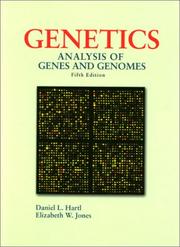
ISBN: 0763709131 Year: 2001 Publisher: Boston Jones and Bartlett
Abstract | Keywords | Export | Availability | Bookmark
 Loading...
Loading...Choose an application
- Reference Manager
- EndNote
- RefWorks (Direct export to RefWorks)
genomes --- Génétique des populations --- Genetics (General) --- Genetics (General). --- Genetics --- Biology --- Embryology --- Mendel's law --- Adaptation (Biology) --- Breeding --- Chromosomes --- Heredity --- Mutation (Biology) --- Variation (Biology) --- genetics --- genes --- genetic engineering --- population genetics --- Human genetics --- Molecular biology --- Genetics. --- Basic Sciences. Genetics --- Génétique

ISBN: 9780511612961 9780521803175 9780521005500 0511018290 9780511018299 0511612966 0521803179 0521005507 1107123240 0511561334 0511154925 0511047932 Year: 2001 Publisher: Cambridge Cambridge University Press
Abstract | Keywords | Export | Availability | Bookmark
 Loading...
Loading...Choose an application
- Reference Manager
- EndNote
- RefWorks (Direct export to RefWorks)
An engaging area of biology for more than a century, the study of macroevolution continues to offer profound insight into our understanding of the tempo of evolution and of the evolution of biological diversity. What regulates biological diversity and its historical development? Can it be explained by natural selection alone? Has geologic history regulated the tempo of diversification? This expanded and updated second edition offers a comprehensive look at macroevolution and its underpinnings, with a primary emphasis on animal evolution. From a Neodarwinian point of view, it integrates evolutionary processes at all levels to explain the diversity of animal life. It examines a wide range of topics including genetics and speciation, development and evolution, the constructional and functional aspects of form, fossil lineages, and systematics, and it takes a hard look at the Cambrian explosion. Researchers and graduate students will find this book a most comprehensive examination of macroevolution.
Genetics --- Macroevolution --- Paleontology --- Fossilogy --- Fossilology --- Palaeontology --- Paleontology, Zoological --- Paleozoology --- Historical geology --- Zoology --- Fossils --- Prehistoric animals in motion pictures --- Evolution (Biology) --- Biology --- Embryology --- Mendel's law --- Adaptation (Biology) --- Breeding --- Chromosomes --- Heredity --- Mutation (Biology) --- Variation (Biology) --- Macroevolution. --- Genetics. --- Paleontology.
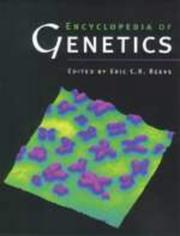
ISBN: 1884964346 9781884964343 Year: 2001 Publisher: London Dearborn
Abstract | Keywords | Export | Availability | Bookmark
 Loading...
Loading...Choose an application
- Reference Manager
- EndNote
- RefWorks (Direct export to RefWorks)
"Discoveries in genetics are reported daily. Written for academic audiences and well-informed generalists, this authoritative and impressivly up-to-date 125-entry encyclopedia covers not only the basics and principles of genetics, but details the role of genetics in current issues, such as diseases, disorders, aging, sex, conservation, mapping, gene therapy, and food and nutrition."--"Outstanding Reference Sources," American Libraries, May 2002.
Genetics --- Génétique --- Encyclopedias --- Encyclopédies --- Genetique --- English --- 575 <03> --- 575 --- Biology --- Embryology --- Mendel's law --- Adaptation (Biology) --- Breeding --- Chromosomes --- Heredity --- Mutation (Biology) --- Variation (Biology) --- General genetics. General cytogenetics. Immunogenetics. Evolution. Speciation. Phylogeny--Naslagwerken. Referentiewerken --- 575 <03> General genetics. General cytogenetics. Immunogenetics. Evolution. Speciation. Phylogeny--Naslagwerken. Referentiewerken --- Génétique --- Encyclopédies --- Genetics - Encyclopedias. --- Genetics - cncyclopedias - English --- Genetique - Encyclopedies
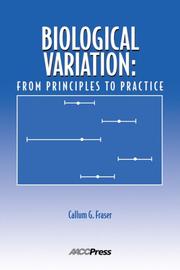
ISBN: 1890883492 Year: 2001 Publisher: Washington, DC : AACC [American Association for Clinical Chemistry],
Abstract | Keywords | Export | Availability | Bookmark
 Loading...
Loading...Choose an application
- Reference Manager
- EndNote
- RefWorks (Direct export to RefWorks)
Clinical chemistry --- Reference values (Medicine) --- Variation (Biology) --- Biological variation --- Biology --- Heredity --- Genetics --- Mutation (Biology) --- Biochemical reference values --- Clinical reference values --- Medical reference values --- Normal ranges (Medicine) --- Normal values (Medicine) --- Physiological reference values --- Ranges, Reference (Medicine) --- Reference ranges (Medicine) --- Values, Reference (Medicine) --- Chemistry, Clinical --- Diagnostic biochemistry --- Diagnostic chemistry --- Medical chemistry --- Biochemistry --- Diagnosis, Laboratory
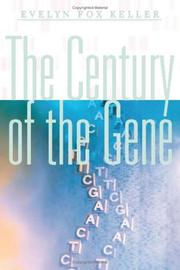
ISBN: 9780674039438 0674039432 0674008251 9780674008250 0674003721 9780674003729 Year: 2001 Publisher: Cambridge, Mass. Harvard University Press
Abstract | Keywords | Export | Availability | Bookmark
 Loading...
Loading...Choose an application
- Reference Manager
- EndNote
- RefWorks (Direct export to RefWorks)
In a book that promises to change the way we think and talk about genes and genetic determinism, Evelyn Fox Keller, one of our most gifted historians and philosophers of science, provides a powerful, profound analysis of the achievements of genetics and molecular biology in the twentieth century, the century of the gene. Not just a chronicle of biology’s progress from gene to genome in one hundred years, The Century of the Gene also calls our attention to the surprising ways these advances challenge the familiar picture of the gene most of us still entertain. Keller shows us that the very successes that have stirred our imagination have also radically undermined the primacy of the gene—word and object—as the core explanatory concept of heredity and development. She argues that we need a new vocabulary that includes concepts such as robustness, fidelity, and evolvability. But more than a new vocabulary, a new awareness is absolutely crucial: that understanding the components of a system (be they individual genes, proteins, or even molecules) may tell us little about the interactions among these components. With the Human Genome Project nearing its first and most publicized goal, biologists are coming to realize that they have reached not the end of biology but the beginning of a new era. Indeed, Keller predicts that in the new century we will witness another Cambrian era, this time in new forms of biological thought rather than in new forms of biological life.
Genetics --- Biology --- Embryology --- Mendel's law --- Adaptation (Biology) --- Breeding --- Chromosomes --- Heredity --- Mutation (Biology) --- Variation (Biology) --- History --- History. --- Philosophy of science --- genetica (genen) --- moleculaire biologie --- génétique (gènes) --- biologie moléculaire --- 577.21 --- biologie --- evolutie --- genen --- genetica --- Human Genome Project --- prenatale diagnostiek --- recombinant DNA --- regulatie --- replicatie --- transcriptie --- translatie --- Genetics - History - 20th century
| Listing 1 - 10 of 13 | << page >> |
Sort by
|

 Search
Search Feedback
Feedback About UniCat
About UniCat  Help
Help News
News